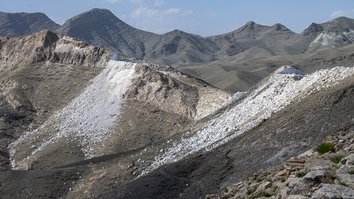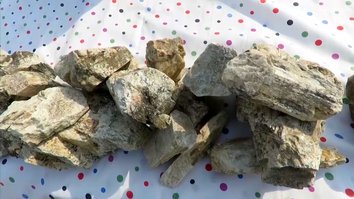MES AYNAK -- An ancient city carved out of immense peaks in Logar province near Kabul is in danger of disappearing forever, swallowed up by a Chinese consortium exploiting one of the world's largest copper deposits.
Located at the confluence of Hellenistic and Indian cultures, Mes Aynak -- believed to be between 1,000 and 2,000 years old -- was once a vast city organised around the extraction and trade of copper.
Archaeologists have uncovered Buddhist monasteries, stupas, fortresses, administrative buildings and dwellings, while hundreds of statues, frescoes, ceramics, coins and manuscripts also have been unearthed.
Mes Aynak is "one of the most beautiful archaeological sites" in the world, Bastien Varoutsikos, an archaeologist for the French company Iconem, which is working to digitise the city and its heritage, told AFP.
![Part of the archaeological site in Mes Aynak is seen here in a photograph taken May 17. The ancient Buddhist city carved out of immense peaks near Kabul is in danger of disappearing forever, swallowed up by a Chinese consortium exploiting one of the world's largest copper deposits. [Wakil Kohsar/AFP]](/cnmi_st/images/2022/06/23/35907-afghan-ancient-city-585_329.jpg)
Part of the archaeological site in Mes Aynak is seen here in a photograph taken May 17. The ancient Buddhist city carved out of immense peaks near Kabul is in danger of disappearing forever, swallowed up by a Chinese consortium exploiting one of the world's largest copper deposits. [Wakil Kohsar/AFP]
![A Chinese copper mining project poses a direct threat to this ancient Buddhist city carved out of immense peaks near Kabul. The archaeological site in Mes Aynak is seen here on May 17. [Wakil Kohsar/AFP]](/cnmi_st/images/2022/06/23/35908-afghan-city-hillside-585_329.jpg)
A Chinese copper mining project poses a direct threat to this ancient Buddhist city carved out of immense peaks near Kabul. The archaeological site in Mes Aynak is seen here on May 17. [Wakil Kohsar/AFP]
![Part of a statue of Buddha that was uncovered at an archaeological site in Mes Aynak, Logar province, is seen here on May 17. [Wakil Kohsar/AFP]](/cnmi_st/images/2022/06/23/35911-buddha-statue-afghanistan-585_329.jpg)
Part of a statue of Buddha that was uncovered at an archaeological site in Mes Aynak, Logar province, is seen here on May 17. [Wakil Kohsar/AFP]
Objects discovered date mainly from the 2nd to 9th century CE, but pottery also has been found at the site that dates back to the Bronze Age.
Burying the past
Mes Aynak has been compared to Pompeii, Italy, and Machu Picchu, Peru, in size and significance, with ruins that cover 1,000 hectares perched high on a massive peak.
But China is in dire need of copper, and in 2007 the Chinese mining giant Metallurgical Group Corporation headed a state-owned consortium and signed a $3 billion contract to mine ore over 30 years. The consortium is now called MJAM.
Though insecurity and disagreements between Beijing and Kabul over financial terms of the contract caused delays, the project is once again a priority for both parties, and talks are ongoing on how to proceed.
Fears are rising that a place once considered one of the most prosperous trade hubs on the Silk Road could disappear without oversight.
In the early 2010s, it was "one of the largest archaeological projects in the world", Varoutsikos said.
MJAM originally suspended the start of operations for three years to allow archaeologists to focus on the area directly threatened by the mine.
That period was inadvertently lengthened as the security situation prevented the Chinese from building planned infrastructure.
As a result, thousands of objects were unearthed -- some were taken to the Kabul museum, others kept nearby. But many of the remains are simply too bulky or fragile to be moved, and seem destined to disappear.
The Chinese favour open-pit rather than underground mining. If it goes ahead, it would open up the copper mountain and bury all the fragments of the past.
Environmental consequences
The Chinese project has raised concerns about environmental consequences, as copper mining is polluting and requires large quantities of water, and as Logar is already an arid region.
But the prospect of money appears to be driving the mine project forward.
The Mes Aynak mine has the potential to generate more than $300 million a year -- about 60% of the full Afghan government budget for 2022 -- and plans are in motion to speed up the process.
The discussions are reportedly "80% finished" on the contract -- which includes the construction of a power station to supply the mine and Kabul, and a railway to Pakistan -- with only technical points remaining to be settled.
For now, the delay is some salvation for archaeologists.
While there is no work going on at the site, Varoutsikos hopes to restart the excavation before the start of mining operations.
But even that will depend on international collaboration and funding, he said.
Caution is needed
Afghanistan is sitting on huge mineral resources of copper, iron, bauxite, lithium and rare earth metals estimated to be worth more than $1 trillion.
China has eyed Afghanistan's rare earth metal deposits for years and has been waiting for the right opportunity to lay its hands on them as they provide a great source of profit, said Abdul Ghafoor Nawrozi, a civil society activist in Herat city, last December.
In a November visit to Herat province, one Chinese businessman stressed his interest in investing in the processing and selling of Afghan saffron.
Soon after, a number of Chinese investors arrived in Afghanistan to look into investing in the country's lithium deposits, China's Global Times reported.
Efforts by Chinese companies to invest in Afghanistan's mining sector since last August also have raised questions among Afghans.
Caution is needed when awarding contracts to Chinese mining companies to avoid the plundering of Afghanistan's natural resources, said economist Sayed Kabir Hussaini of Herat city, also in December.
"Chinese companies will never invest in Afghanistan unless they make a lot of profit in return," he said. "Agreements with these companies must be designed to prevent any loss to Afghanistan."
Rare earth metal and precious metal deposits should not be given to Chinese companies on the cheap, Hussaini added, noting that China's singular focus on those deposits does not indicate good intentions.

![The base of a Chinese consortium in Mes Aynak is seen here in a photo taken May 17. The copper mining project is threatening an ancient city carved out of immense peaks at the site. [Wakil Kohsar/AFP]](/cnmi_st/images/2022/06/23/35906-china-consortium-afghanistan-585_329.jpg)







With the reduction of international aid to Afghanistan, the best way to rescue the country’s economy is to promote exports through other sectors, especially selling of minerals, however, these minerals may have multiple added values if they are processed. The processing of ore in the value chain of the mineral industry is paving the way to an added value that could be useful for Afghanistan’s dire economic crisis. The ore will have more value after processing and this is something that should be considered special. Afghanistan is a poor country that has a lot of mines, and the lack of necessary infrastructure is the reason that the issue of mines' processing could not get into its proper place. Meanwhile, the sanctions and some complications have caused problems for the investors. Selling of raw material prevents us from making progress. When it comes to the export of ore, we should try not to export it in the form of raw material. When the minerals are exported in the form of raw, it causes a reduction in job opportunities. This issue decreases the added value of these minerals for us and easily go to the hand of other countries. Nowadays, many countries that export processed ore are the first importers of minerals, and we who have large mineral resources in Afghanistan should not miss this opportunity. The selling of raw materials prevents us from the route of development, many developed countries managed to solve their economic problems by creating added value from thes
Reply5 Comment
Now Afghanistan does not have a proper owner, and countries in the region are trying to steal their shares. News of Pakistan's covert and known thefts also have increased recently. Trafficking in coal, precious stones, and even weapons from the former Afghan army is a big part of it. While Pakistan has imposed sanctions on Afghanistan's agricultural products and will not allow them to do so, it has instead prioritized plundering Afghanistan's mines. It is now known that the Prime Minister of Pakistan has said that Pakistan should import high-quality coal from Afghanistan at a lower price instead of substandard South African coal and, in return, pay Afghans its rupee instead of dollars. Pakistan, as the illegitimate offspring of China, wants to plunder Afghanistan, and the world also does not want to stop Pakistan.
Reply5 Comment
An international organization called Global Witness has also issued a report about this in which they criticized the corruption and other problems in the contract. While the contract hasn’t been shared with the people, the organization warned about the circumstances of conflict, corruption, human rights' violation, and environmental pollution in the contract of copper mining in Logar province, and said that the delay in the publishing of the contract is the major obstacle in order to ensure the proper ruling of the project. Juman Cuba, a member of Global Witness said, Afghanistan’s largest mining contract may have dire consequences such as conflict, corruption, human rights' violation, environmental pollution, and the destruction of Afghanistan’s historical heritage. Juman Cuba said, the Global Witness report also emphasizes the positive economic, social, and infrastructural commitments and the vital commitments to support local residents and the environment which would come under the potential impact of the mining operation.
Reply5 Comment
Mining will benefit Afghans in one way or another, but China, wherever it has gone, has mined and indebted those countries. Such as Pakistan and African countries. Pakistan first allied with China. For many years the Chinese worked there, building Pakistan on the one hand but indebted to it on the other. Now, every day, Pakistanis are criticizing their government. So the point is that if China gets its hands on mining in Afghanistan, it has to do with a systematic plan to provide jobs for Afghans, not just ordinary Chinese. The other thing is that if this mine is mined, this historic city may be destroyed, and the other disadvantage is that we will be trapped in a trap and not get into debt like Pakistan and African countries. But we complain that all the people are now branded as Taliban, so why didn't the previous government train cadres in the mining sector in the last 20 years? Why did they not train engineers? And why didn't the world give us mining technology? All is just cheating.
Reply5 Comment
The news is both good and bad. It is good news because one of Afghanistan's mines will be mined, and the benefits will go to the Afghans. It is terrible because the Chinese are hungry and thirsty, then what benefit will they give us? The Chinese are as bastards as they even bring their labor workers when working in any country. That is, they do not employ locals. The international coalition should have trained at least 500 Afghans in mining over the past 20 years. Also, they should have given Afghanistan mining technology. We would not need the Chinese now if we had cadres and equipment.
Reply5 Comment